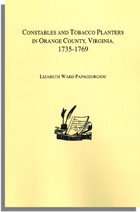Mid-18th-century Orange County was the parent county of contemporary Orange, Culpeper, Rappahannock, Madison, and Greene counties, as well as the original counties of Frederick and Augusta. At that time tobacco was not only the colony’s prevailing staple but also its main form of currency. In order to maintain the quality of tobacco production, the county court’s justices divided the county into precincts and appointed a local resident of each as constable for one year. The constable’s primary function was to inspect and count the annual tobacco crop. (Over time, constables were also expected to apprehend felons, guard prisoners, capture runaways, oversee militia musters, and so on.) Between 1735 and 1769, the Orange County court appointed over 200 constables in some forty Orange County precincts.
Constables and tobacco planters populate the pages of this latest piece of scholarship by Lizabeth Ward Papageorgiou, and it will delight students of Orange County genealogy and local history alike. Drawing on county court order books (during a complicated period of boundary changes), published research, and other sources, Mrs. Papageorgiou has reconstructed the constable precincts, explaining where they exist today. Then, year by year between 1735-1769, she positions each constable in his corresponding precinct. In the substantial appendix to the work, the author does the same for the county’s larger tithable precincts, where she spells out who was responsible for compiling each list of Orange County tithables. Anyone hoping to pinpoint the location of an Orange County ancestor will want to pore over Mrs. Papageorgiou’s extensive annotations, which explain how she was able to pinpoint the location of precinct boundaries. At the book’s conclusion, researchers will find a complete name index, containing over 3,000 references.


